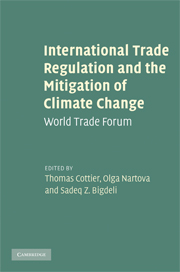Book contents
- Frontmatter
- Contents
- Contributors
- List of figures
- List of tables
- List of abbreviations
- Preface
- PART I Climate change mitigation: scientific, political and international and trade law perspectives
- 1 Earth in the greenhouse — a challenge for the twenty-first century
- 2 A survey of Kyoto tools for greenhouse gas reductions: speculations on post-Kyoto scenarios
- 3 International environmental law and the evolving concept of ‘common concern of mankind’
- 4 Domestic and international strategies to address climate change: an overview of the WTO legal issues
- PART II Climate change mitigation and trade in goods
- PART III Trade in renewable energy sources
- PART IV Climate change mitigation and trade in services
- PART V Climate change and technology transfer, investment and government procurement: legal issues
- PART VI Institutional challenges and the way forward
- Index
4 - Domestic and international strategies to address climate change: an overview of the WTO legal issues
from PART I - Climate change mitigation: scientific, political and international and trade law perspectives
Published online by Cambridge University Press: 04 August 2010
- Frontmatter
- Contents
- Contributors
- List of figures
- List of tables
- List of abbreviations
- Preface
- PART I Climate change mitigation: scientific, political and international and trade law perspectives
- 1 Earth in the greenhouse — a challenge for the twenty-first century
- 2 A survey of Kyoto tools for greenhouse gas reductions: speculations on post-Kyoto scenarios
- 3 International environmental law and the evolving concept of ‘common concern of mankind’
- 4 Domestic and international strategies to address climate change: an overview of the WTO legal issues
- PART II Climate change mitigation and trade in goods
- PART III Trade in renewable energy sources
- PART IV Climate change mitigation and trade in services
- PART V Climate change and technology transfer, investment and government procurement: legal issues
- PART VI Institutional challenges and the way forward
- Index
Summary
Introduction
This paper seeks to provide an overview of the issues of World Trade Organization (WTO) law that are raised by domestic and international policy strategies to address climate change. The paper also provides a non-exhaustive survey of, and commentary on, the existing literature that concerns these issues.
Climate change, which has identifiable potentially catastrophic effects on the environment and human security in the broadest sense, cannot be halted, much less reversed, without the control and reduction of carbon dioxide (CO2) emissions into the atmosphere. Current CO2 levels in the atmosphere are higher than at any time in the last 450,000 years, and some analyses indicate that CO2 levels are at their highest in twenty million years. Associated with a rise in CO2 levels is a rise in global temperatures, and current projections by the Intergovernmental Panel on Climate Change (IPCC) suggest that without measures to reduce emissions, over the course of this century global average temperatures will increase by 1.8–4.0 °C. Rising temperatures are already causing Arctic ice to melt, glaciers to retreat and ocean levels to rise, threatening inhabitants of low-lying lands worldwide. Since these CO2 emissions are, given current technologies, an inevitable byproduct of much of the energy consumed for transportation, industrial production, and domestic use, the challenge of halting and ultimately reversing climate change is an enormously difficult one.
- Type
- Chapter
- Information
- International Trade Regulation and the Mitigation of Climate ChangeWorld Trade Forum, pp. 48 - 94Publisher: Cambridge University PressPrint publication year: 2009
- 16
- Cited by



